Why is sleeping so complicated?
A Harvard Med School Postdoc is answering our sleep-related FAQs
I don’t need to tell you this, but sleep is all the rage now. Allegedly.
Somewhere between 2016 and 2020, our society’s sleep discourse shifted — what I call the Arianna Huffington Effect. This is when our conversations over morning coffee went from “I stayed up all night” to “I got 8 hours of uninterrupted sleep.” When “I have to go home, it’s a school night,” became a viable excuse for dipping out of plans early (ironically only used by non-students). When REM reentered the vernacular, sans Michael Stipe.
You can blame the sleep craze on the rise of VC-backed wellness or the residual pandemic-inspired hermetic tendencies, but the answer remains the same: going to bed is serious business.
Depending on where on the internet you reside, things have only gotten crazier. You could say we’re officially in second wave of sleeptivism; we’re taping our mouths shut for optimal breathing. We’re investing in snore-stopping mattresses. We’re analyzing our own heart-rate variability and oxygen saturation and bodily temperature upon waking.
I’m on record as saying sleep discourse is sexless and corny — which I stand by — but unfortunately I also think it’s interesting. What can I say, it’s hard containing multitudes. I’m mostly curious about sleep as a conversation not because I’m relatively good at it (#blessed), but apparently a huge swath of the population is not. And there is nothing, and I mean nothing, worse than not sleeping well.
But here’s the universal truth: internet trend + desperate people looking for a solution = fake news. Between the terrifying reels on my explore page yelling at me about “WHAT I DON’T KNOW I’M DOING WRONG” and well-meaning but unsubstantiated claims about blue light glasses from my friends over dinner, I’m convinced 50% of the sleep discourse is hearsay. And look, I’m sure some bits from Andrew Huberman’s 3-hour diatribes are plausible, but I’d rather take matters into my own hands and talk to an expert myself.
Today’s very lovely expert is Katie S. McCullar, PhD. She’s a Postdoctoral Fellow at Mass General Hospital and Harvard Medical School, where her research focuses on circadian rhythms and sleep. She earned her PhD from Brown University, with a dissertation on how consecutive nights of alcohol usage affects human sleep. Clearly, she’s the perfect person to harass with all of my (our) burning sleep questions. So, without further ado…
First, let’s get on the same page about some of the sleep jargon that’s getting thrown around. Can you help define the important glossary terms?
REM - Rapid-eye movement (REM) sleep: This is a stage of sleep that is characterized by rapid eye movements (as suggested by the name): The eyes move quickly under the eyelids, even when the person is asleep. This is the stage of sleep associated with the most vivid dreaming. In addition, there is an increase in brain activity accompanied by muscle paralysis to ensure you don’t accidentally act out your dreams!
Deep Sleep - Deep sleep refers to a stage of sleep often called Slow Wave Sleep, or Stage 3 sleep. Slow, large brain waves characterize this stage of sleep, and this is why it is often called Slow Wave Sleep (SWS).
In addition to these characteristic brain waves, there is a decrease in heart rate, breathing rate, and body temperature during this sleep stage. SWS is the most restorative stage of sleep, essential for physical recovery, immune function, and memory consolidation.
Circadian Rhythm - Circadian rhythms are internal physiological processes that cycle every ~24 hours that regulate multiple physiological functions that include the sleep-wake cycle, body temperature, and hormone release. Light is the most potent stimulus for circadian rhythm entrainment to environmental time.
Sleep Cycle - Throughout the night, you cycle through the various sleep stages multiple times. The general flow of stages goes from light sleep (Stage 1 and then Stage 2), then to Stage 3 (SWS), and then finally we enter REM sleep. This cycle repeats every 90-120 minutes.
Typically, we spend more time in SWS in the first few cycles and slowly spend more time in REM with each subsequent cycle. This means we spend more time in SWS at the start of the night and more REM sleep at the end of the night - therefore, if you cut your sleep short, it is REM sleep that takes the biggest hit.
Sleep Hygiene - Sleep Hygiene refers to practices and routines that can help optimize your evening routine and sleep environment. Some examples of what sleep hygiene includes:
keeping a consistent sleep schedule that includes about 8 hours of sleep for most adults (this can range from 7-9 hours depending on individual differences and age)
making sure your sleep environment is comfortable and conducive for sleep (including keeping it dark, quiet, and cool)
establishing a nighttime routine that promotes sleep (this may include no screen time before sleep, using dim lighting in the hours before bed, etc).
Latency - When we use the term latency, we most commonly refer to “Sleep latency,” or the time it takes you to fall asleep once you have settled into bed. Sleep latency is typically between 10 and 20 minutes.
Sleep Architecture - Sleep architecture refers to the pattern and sequence of different sleep stages experienced throughout a night. It describes the structure and organization of sleep, including the timing and duration of each sleep stage. This pattern is often shown using a graph called a hypnogram. This is usually what your smart watch or Oura ring produces to show the time spent in each stage of sleep.
What are the markers of a good night's sleep?
I know this is a bit idealistic, but one indication is the ability to wake up without an alarm. This shows that you are getting sufficient sleep and your body wakes up naturally. Another indication is that you wake up feeling well-rested even when needing to use an alarm. Well-slept individuals also tend to have better cognitive functioning and may experience more stable moods.
Is a sleep “chronotype” a real thing?
Yes! We often call this morningness or eveningness, sometimes we call them “morning larks” or “night owls.” This refers to a natural inclination of your body to sleep and wake at a given time. In addition, there can be significant individual differences in performance across the day depending on chronotype.
What’s the deal with movement in your sleep? Is too much movement an indicator that something’s up?
Movement in sleep is typically totally normal. You can start to be concerned if you start acting out your dreams - this typically happens once you are over the age of 50 and may indicate that you are at risk of developing a neurological disorder.
What are the biggest mistakes people are making when it comes to their sleep?
Watching TV while trying to sleep can negatively impact your sleep due to the light exposure as well as the potential noise, both of which can disrupt sleep. Any screen time in bed introduces additional light, making it more difficult to sleep.
Similarly, what are the internet sleep myths that irritate you?
The idea that people can adapt to short sleep! This is simply not the case — some people can adapt to feelings of sleepiness, but they remain in sleep debt and their objective performance suffers.
Nightly melatonin — this is not recommended because it can make you feel more sluggish in the morning if you take it right before bed, which is typically how people take this supplement over the counter. To that point, you may want to avoid giving it nightly to children close to puberty, as melatonin is a hormone and can impact puberty. Again, if you feel like you or your child cannot sleep without nightly melatonin, please contact a doctor.
Are there any sleep-related supplements you can get behind?
Magnesium in the evening if you are seeking out a sleep aid in the short term. While it may not be a miracle cure for sleep problems, its potential to support relaxation and improve sleep quality makes it a useful option for many. However, it’s important to approach it as part of a broader healthy sleep routine and consult with a healthcare provider if you find that you are consistently reaching for a sleep aid, as this may indicate the presence of a sleep disorder.
Can you walk us through an ideal bedtime routine?
I always recommend dimming the lights at least an hour before bed. Stop screentime in the hour before bed and try to do a relaxing activity like reading a book to transition to the quiet time of the day. People have also reported improved sleep from taking a hot bath or shower before sleep. If you find you crave a drink of some kind, I encourage people to reach for a warm tea in place of an alcoholic drink. Finally, if you feel like you are easily disturbed by sound, try to use soft foam earplugs.
Let’s talk about alcohol. Why does it mess up your quality of sleep so much?
Thanks for this question! This was actually the focus of my PhD dissertation. Alcohol is often used as a sleep aid because it decreases your sleep latency, or the time it takes to fall asleep, so people incorrectly assume it helps you sleep!! Although falling asleep faster is tempting, the way alcohol impacts the rest of your sleep is cause for concern. Drinking before sleep has been shown to decrease your total sleep duration and the amount of time you spend in REM sleep.
How important is the wakeup aspect of your sleep when it comes to good hygiene?
Your wake-up routine is also important for good sleep health. Consistency is key - whenever possible, waking up at the same time daily is great for optimizing your circadian system. Regular wake-up times can also help you fall asleep at night as your body becomes accustomed to a pattern, and you can naturally feel sleepy at the right time each evening.
I also recommend exposure to natural light as soon after waking as possible. This can be as easy as looking out the window. This simple practice also helps you entrain to your environmental light/dark cycle.
Any other pieces of sleep wisdom you want to leave us with?
If you wake up constantly feeling sleepy, even after getting 8-9 hours of sleep a night - there could be a chance you have a sleep disorder and should check in with your doctor.
I’m very grateful for Katie and her thoughtful responses to my barrage of questions. If you still have unanswered sleep queries, by all means, leave them in the comments and maybe we can run it back for round 2.
Food for Thought
Rounding this out with some sleep-related recommendations…
I’ve said it once and I’ll say it again, the Hatch Restore is worth all of the hype. I particularly love its dual alarm clock + white noise machine functionality.
I’m a big white noise head, and on the nights without my Hatch, I used to turn to a classic Spotify 12-hour white noise playlist (YKTV). But I recently learned a mind-blowing hack which is that the iPhone has a built-in white noise setting of its own?? Thrilled to know that my Wrapped will not be Box Fan Sounds (AD-FREE) this year.
These Cymbiotika Magnesium L-Threonate pouches reminded me of the weird energy packets my dad used to keep in the pantry for his marathon training, so naturally I bought 10 at once. I was slightly repulsed at first, but determined to finish my stash, I powered through and came out the other side loving them.
If I need some extra help winding down, the Moon Juice Sleepy Magnesi-Om will knock me out, guaranteed.
I haven’t tried anything from Ostermoor yet but it is certainly on my radar…
That’s all for now. Reply to this email or leave a comment if you want to reach me. :)



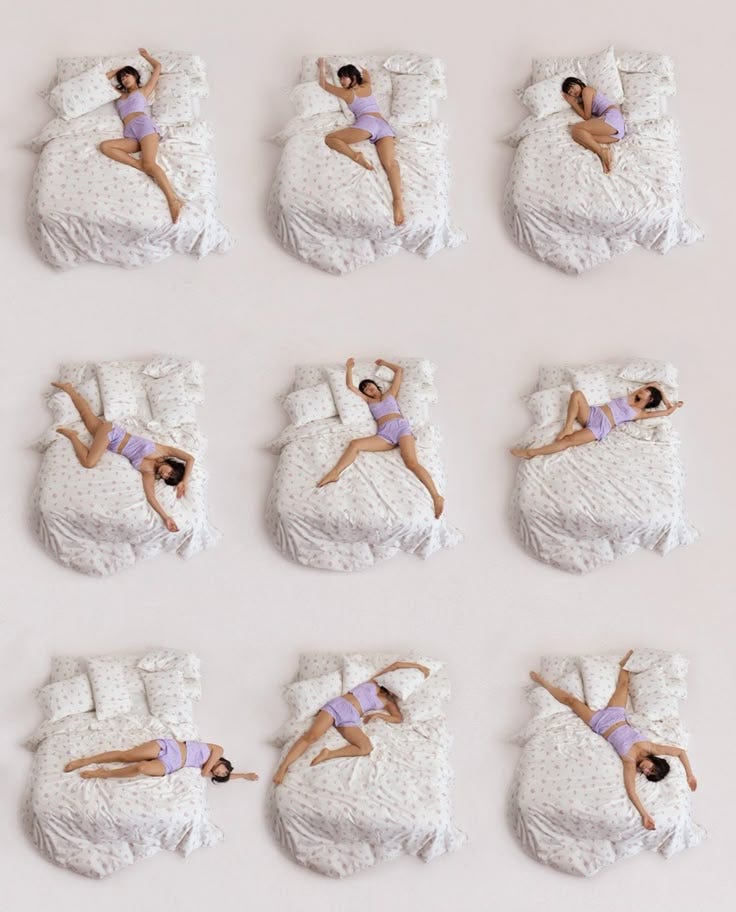
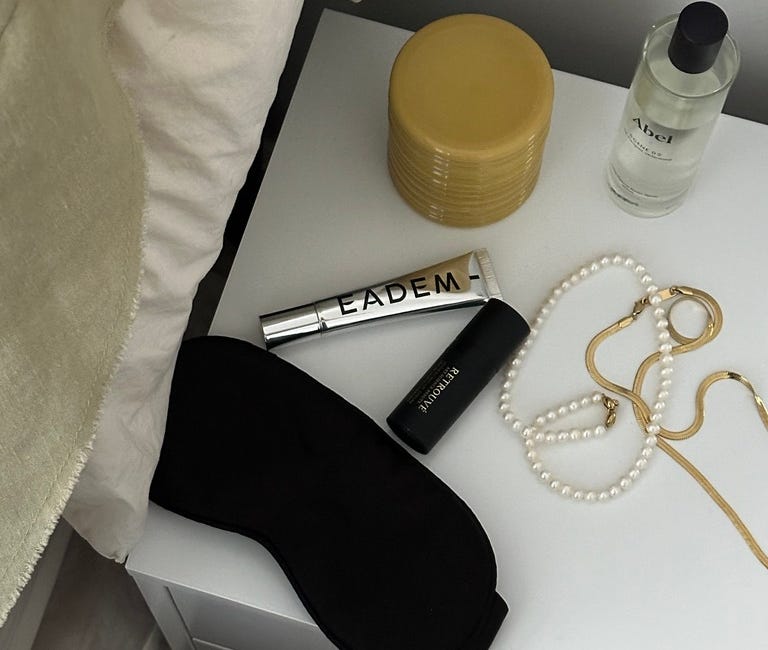

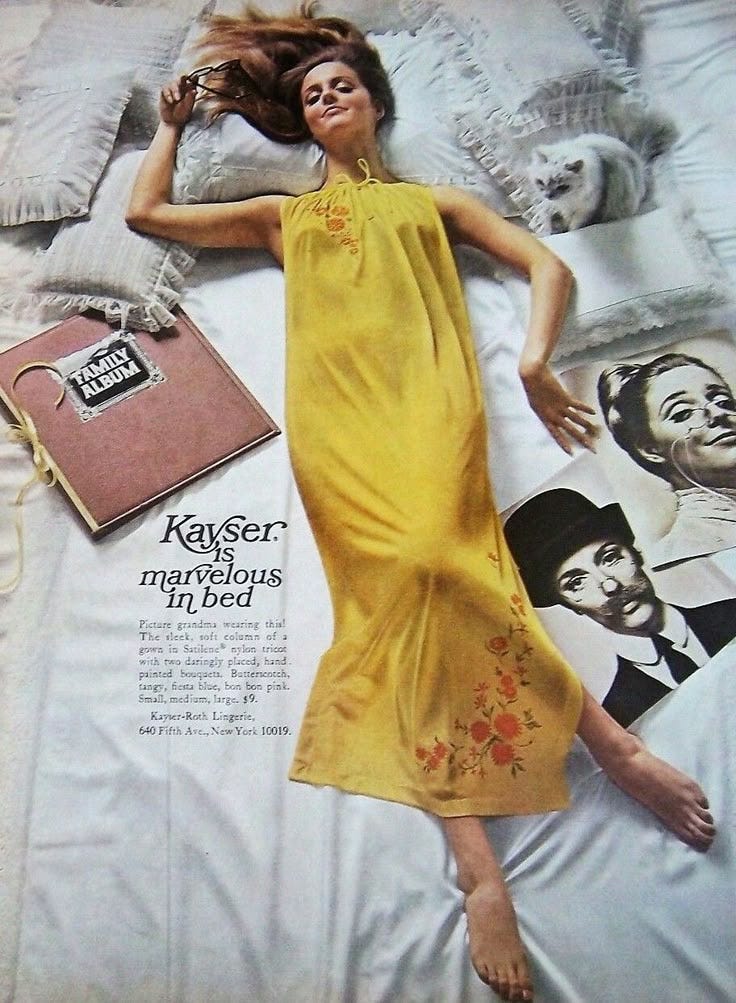
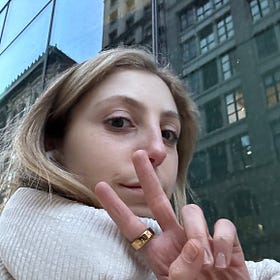
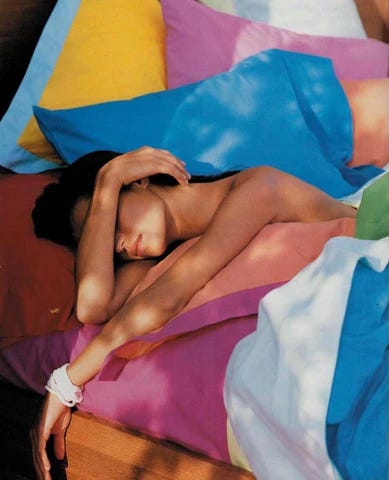
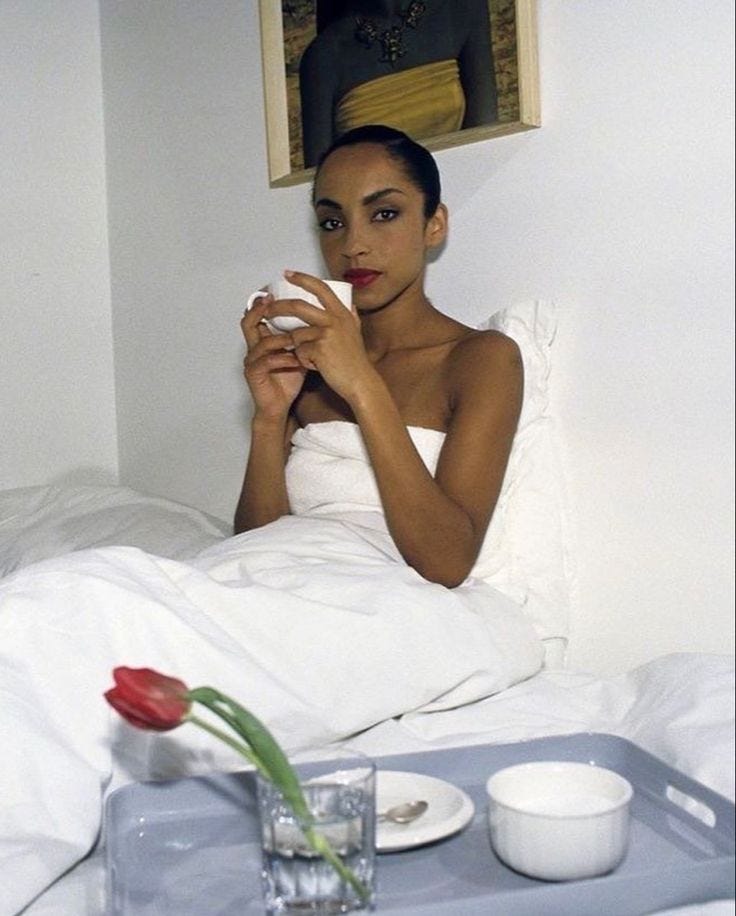
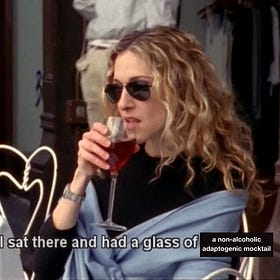
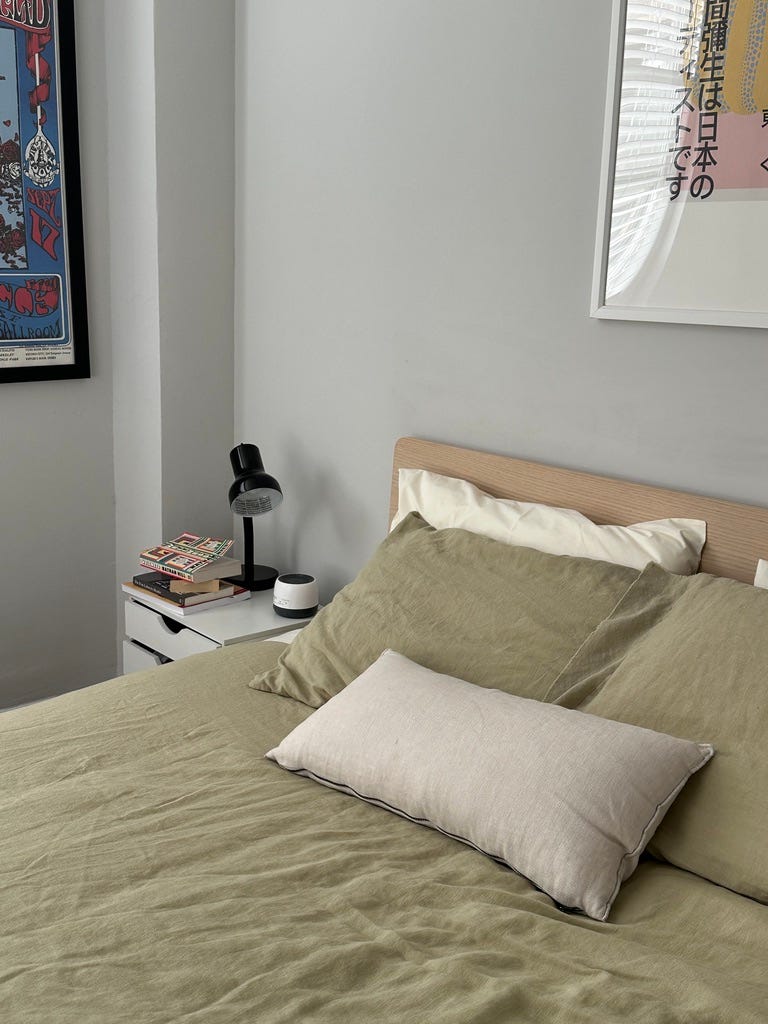
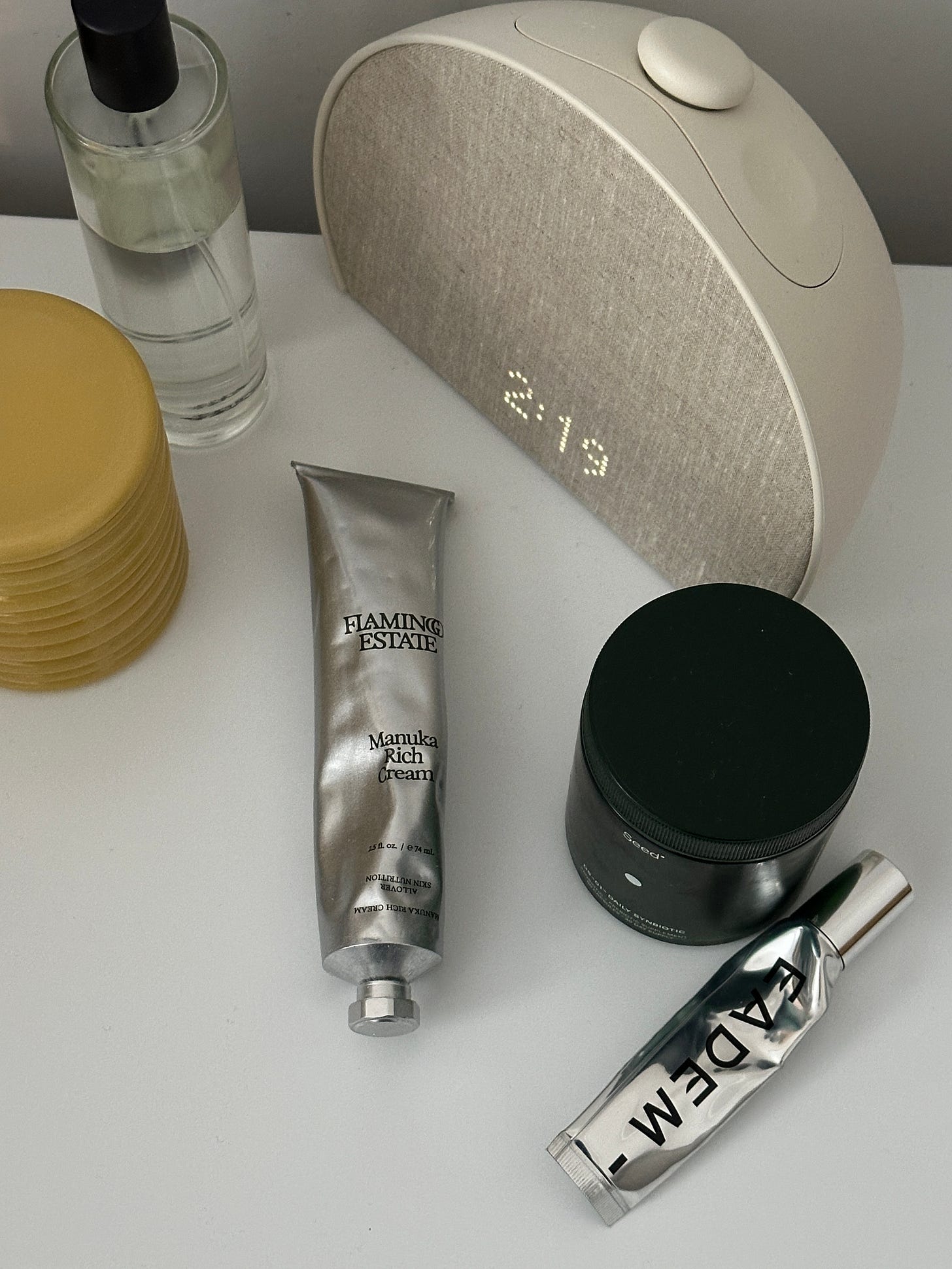
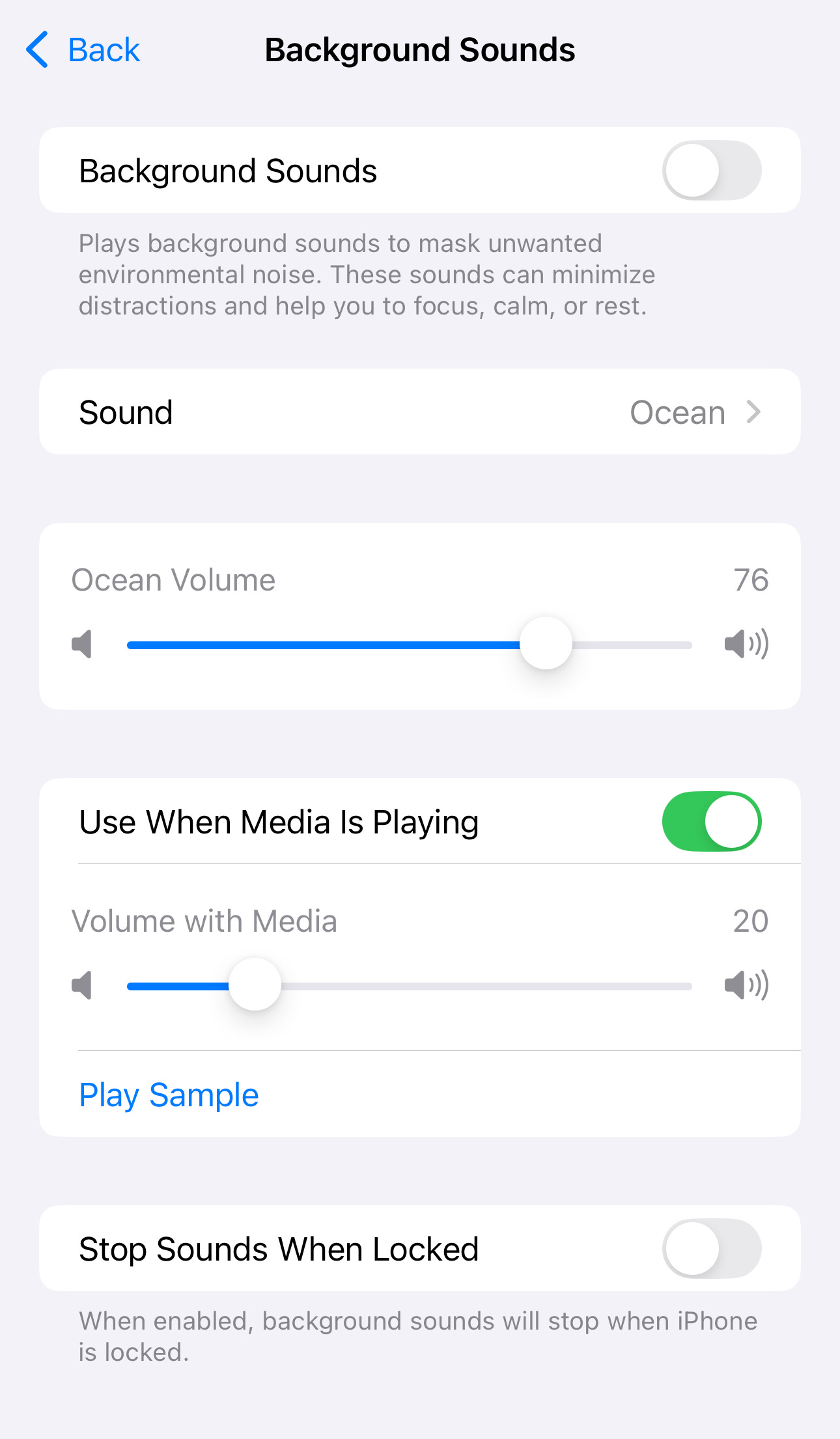
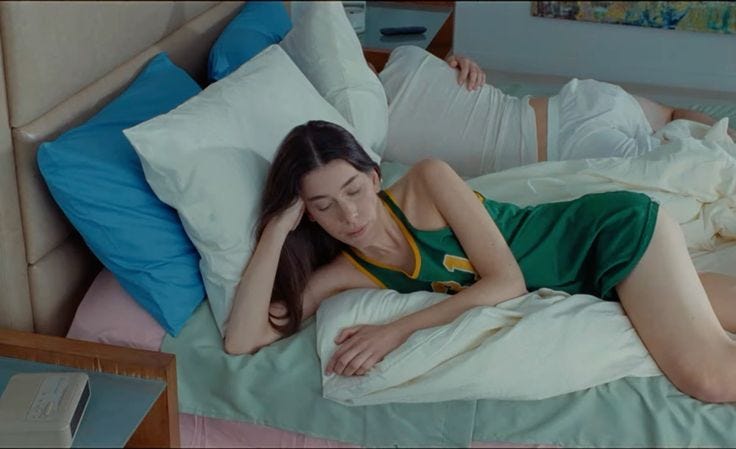
Hate to say that I have a sleep stack... but I sleep so well so here we are
- blackout curtains
- 8 sleep for temp control
- weighted blanket (cotton!!! This is key)
- latex (foam) pillow
- no phone in room (I use the 8 sleep vibration alarm)
- silicon earplugs that broke off in my ear once but I have small ear canals and can't quit them because they're the only ones that work
- chelated magnesium
Downside is that travelling sucks for me now 😔
obsessed with this article is an understatement